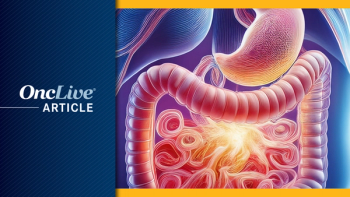
Elevated AFP in Relapsed/Refractory Metastatic HCC
Transcript:
Ghassan K. Abou-Alfa, MD, MBA: We have another drug, which I would like to hear your thoughts on. But before we talk about ramucirumab, I would like to go back to Catherine. AFP [alpha-fetoprotein], what’s AFP?
Catherine Frenette, MD, FAST, AGAF: That’s a great question. AFP is a protein that is released by hepatocellular carcinoma [HCC], as well as other cancers it’s been reported in, as well as the liver itself when it is injured and regenerating. And I explain it to my patients as, AFP is a sign of liver cell growth and regeneration. For instance, in someone with an acute liver injury, we want to see high AFP to tell us that the liver is trying to heal. It has been shown that patients who have liver cancer with a high AFP have a little bit worse prognosis, but we also know it’s not a perfect test because many liver cancers don’t release AFP at all. It’s a tool, but it’s only 1 tool and you can’t hang your hat on the whole story.
Ghassan K. Abou-Alfa, MD, MBA: Fair enough. With that important introduction, let’s put it in perspective. Tim, back to you. Ramucirumab, tell us the story.
Tim F. Greten, MD: All right. Ramucirumab is I would say typical of vascular targeting agents, an antibody targeting the VEGF receptor. It’s also tested in HCC, and it also has—similar to cabozantinib—
an interesting story because it was tested, like many other drugs in HCC, and initially it actually failed. It was used in all comers, and then there was this interesting observation that a subgroup analysis realized that patients with high AFP actually had a much better outcome than the patients with lower AFP. So we decided to repeat the study, and the study was then successfully conducted and showed that in patients with an AFP greater than 400 ng/mL, there’s an improvement in the outcome and survival of patients treated with ramucirumab.
Ghassan K. Abou-Alfa, MD, MBA: This is REACH-2 that you’re talking about. Catherine, back to your AFP, before I ask Mike another question as well, is there anything magical about the 400 ng/mL?
Catherine Frenette, MD, FAST, AGAF: Nothing really magical. It was chosen. Then we’ve looked at AFP in different cutoffs, whether it’s 20 ng/mL or 100 or 400 or 1000, and that’s a common cutoff that we use for many studies with advanced liver cancer. For transplant, for instance, we have a cutoff of 1000; if you have an AFP of over 1000, we don’t proceed with transplant until you get it below 1000 because of the increased risk of recurrence post transplant.
Ghassan K. Abou-Alfa, MD, MBA: Mike, your thoughts on the ramucirumab vis-a-vis the elevated AFP. Does it mean that maybe, as Catherine is suggesting, only patients with really advanced disease, who are really sick, would be the eligible patients for the therapy? Your thoughts?
Michael A. Morse, MD, MHS, FACP: Well, I’m not sure I would say it necessarily means very sick people, because although it’s true that the higher the AFP, at least in somebody who makes it, there tends to be a larger tumor burden, I think the question is, is there an actual biology behind it? And there have certainly been explanations promulgated that there is something different about the molecular makeup, a proangiogenic environment in those tumors that have high AFP. Now whether that will actually turn out to be the case remains to be seen, but at least it offers the possibility that this is more than just a prognostic factor, that it could be an actual biomarker.
Ghassan K. Abou-Alfa, MD, MBA: I totally agree. I put always those 2 scenarios, if one of our colleagues from Hong Kong calls me and they say, “I have a patient with local disease, they’re resectable with an AFP of a half million,” I don’t sweat over it because hepatitis B actually is well known to induce quite a bit of activation of the AFP.
On the other hand, if a patient with AFP of only 100 ng/mL with stage IV disease with hepatitis C, it’s very possible. So I think there’s a certain complexity with the alpha-fetoprotein that really we don’t have yet a full understanding of. And ramucirumab is definitely there. I would say that the REACH-2 showed a clear improvement to survival with ramucirumab. The combination of the 2 studies—REACH and REACH-2, which was a preplanned analysis—definitely shows an improvement in regard to outcome of patients with high AFP, which really reached the same cutoff of 10 months or so of second-line therapy as a median survival.
But again, as we are hearing here, we’re getting a lot of options, which is amazing and probably great news for the patients. Again, to summarize the TKIs [tyrosine kinase inhibitors], we have in first-line lenvatinib as a new agent, and survival has shown noninferiority to sorafenib. But in regard to the response, as we heard from Mike…it really showed improvement in REACH with regard to the RECIST [Response Evaluation Criteria in Solid Tumors] 1.1, 25% or so, and 40% plus in modified RECIST.
In regard to second-line, it is definitely intriguing that we now have 3 drugs. We put the conditional prior sorafenib exposure, prior tolerance to sorafenib requirement to get the regorafenib. We spoke quite a bit about the robust data of cabozantinib, which can be given in the second or third line of therapy. And understandably we’re talking about ramucirumab with the conditional exposure that would require a high alpha-fetoprotein, despite our still incomplete understanding. Probably to be fair, the best we can say is that we do not fully understand the alpha-fetoprotein.
Transcript Edited for Clarity

































